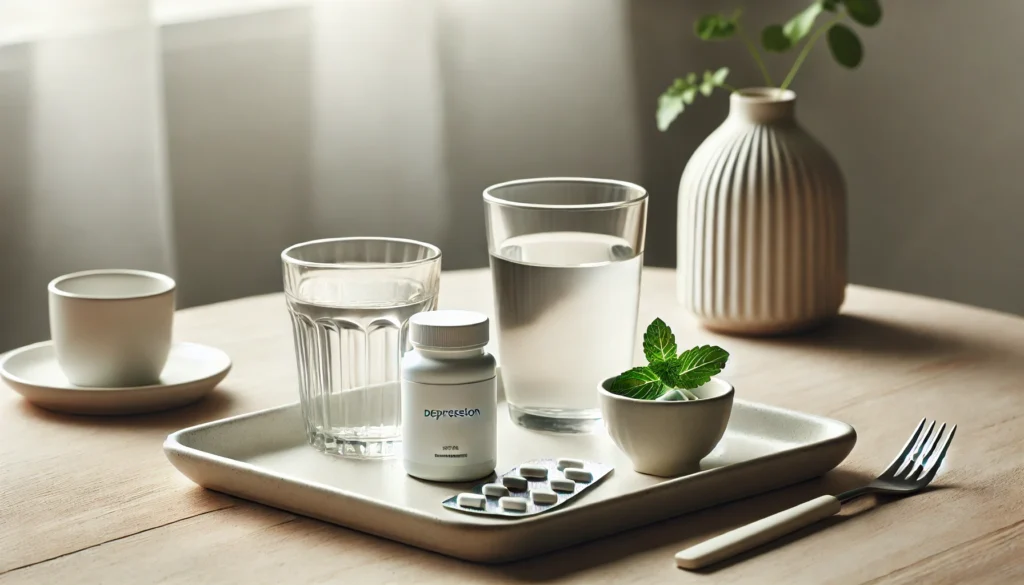Depression is a pervasive mental health issue. It affects millions globally, impacting daily life and overall well-being.
Traditional treatments often involve therapy and medication. However, a growing interest in natural remedies is evident. Among these, vitamin supplements for depression have gained attention.
This article explores the potential benefits of these supplements. It delves into various vitamins and supplements that may help alleviate depression symptoms.
The information provided is backed by scientific research and expert opinions. It offers practical advice on incorporating these supplements into one’s diet and lifestyle.
However, it’s crucial to remember that supplements are not a standalone solution. They should be part of a comprehensive treatment plan, under the guidance of healthcare professionals.
Whether you’re a health coach, a science journalist, or a biohacker, this guide aims to provide reliable, accessible information. It’s designed to help you understand the role of vitamin supplements in depression relief.
Join us as we navigate this complex topic, shedding light on the potential of vitamin supplements in managing depression.
You may also like: Exploring the Benefits of Adaptogen Drops
Understanding Depression and Its Impact
Depression is a complex, multifaceted disorder. It affects emotional, physical, and social well-being. Symptoms can vary from sadness and hopelessness to fatigue and disrupted sleep patterns.
The World Health Organization describes depression as a leading cause of disability worldwide. It doesn’t discriminate, impacting individuals of all ages and backgrounds. Left untreated, depression can impair one’s ability to function at work and in personal life.
It’s important to note that depression is not merely a state of mind. It’s a medical condition with potential biological, psychological, and social triggers. Genetics, brain chemistry, and stressful life events can all contribute to its onset.
Common treatments for depression include therapy and prescription medications. These approaches can help regulate mood and improve quality of life. However, they may not work for everyone, highlighting the need for alternative solutions.
Recently, there’s been a surge of interest in dietary supplements as potential aids for depression. This interest stems from the potential role of nutrition in mental health and well-being. Some people find relief through these supplements, although results can vary.
Key aspects of depression to consider include:
- Psychological Symptoms: Persistent sadness, anxiety, and feelings of worthlessness.
- Physical Symptoms: Changes in appetite, fatigue, and sleep disturbances.
- Social Consequences: Withdrawal from social activities and strained relationships.
Understanding these elements provides a foundation for exploring vitamin supplements’ potential to relieve depression. In the following sections, we will discuss specific vitamins and their roles in supporting mental health.

The Role of Nutrition in Mental Health
Our diet significantly influences mental health. What we consume affects brain chemistry, impacting mood and cognitive function. A nutrient-rich diet can be a key component of mental wellness.
Nutrients like vitamins, minerals, and fatty acids play vital roles in brain health. They’re involved in neurotransmitter synthesis and nerve function, both crucial for maintaining mood balance. Deficiencies in these nutrients can lead to disruptions in mental health.
The modern diet, often high in processed foods and low in essential nutrients, may contribute to depression. Such diets can lead to inflammation and oxidative stress, affecting brain function. Incorporating whole, nutrient-dense foods can counter these effects.
Here are key nutrients for mental health:
- B Vitamins: Support energy levels and cognitive function.
- Vitamin D: Important for mood regulation.
- Omega-3 Fatty Acids: Crucial for brain structure and function.
- Magnesium: Calms and supports a steady mood.
- Zinc: Involved in neurotransmitter pathways.
Evidence suggests a Mediterranean-style diet, rich in fruits, vegetables, whole grains, and healthy fats, supports mental wellness. This diet pattern provides a broad array of vitamins and minerals essential for brain health.
In summary, nutrition forms the backbone of our mental health strategy. By prioritizing balanced diets and addressing potential deficiencies, we offer our brain the resources needed for optimal function. This connection between diet and mental health underscores the potential benefits of integrating dietary supplements into depression care strategies.
Vitamin D: Sunshine for Your Mood
Vitamin D, often called the “sunshine vitamin,” is vital for mood regulation. Our bodies synthesize it when exposed to sunlight. However, many people today spend most of their time indoors, leading to widespread deficiency.
Research links low vitamin D levels to depression. This vitamin helps produce serotonin, a neurotransmitter crucial for mood balance. It’s been observed that individuals with adequate vitamin D levels report a more positive mood and lower risk of depression.
Supplementing with vitamin D might be beneficial, especially in regions with limited sunlight. However, it’s essential to consult with a healthcare professional before beginning supplementation. They can ensure appropriate dosing and monitor levels to avoid potential side effects. Including vitamin D-rich foods, like fatty fish and fortified dairy, can also support healthy levels alongside sun exposure.
Omega-3 Fatty Acids: Brain Food for Emotional Well-being
Omega-3 fatty acids are essential fats that our body cannot produce. They’re found abundantly in fish oil, flaxseeds, and walnuts. These nutrients are crucial for maintaining brain structure and function.
Studies have highlighted the potential of omega-3s in reducing symptoms of depression. These healthy fats play a role in neurotransmitter production, which influences mood and emotional health. Individuals with higher omega-3 intake often report better emotional resilience.
Incorporating omega-3-rich foods into your diet may improve mood stability. Fish like salmon and mackerel are excellent sources. Supplements can also be considered, especially for those with dietary restrictions. As always, consulting a healthcare provider ensures safe and effective supplementation, tailored to individual health needs.
B Vitamins: The Building Blocks of a Balanced Mind
B vitamins are vital for maintaining mental health and cognitive function. These water-soluble vitamins are involved in numerous biochemical processes in the brain. They include B1 (thiamine), B2 (riboflavin), B3 (niacin), B6 (pyridoxine), B9 (folate), and B12 (cobalamin).
Each B vitamin plays a unique role, and deficiencies can impact mood. For instance, B12 and folate are essential for producing neurotransmitters like serotonin, which influence mood and emotion. People with low levels of these vitamins may experience increased depression symptoms.
A diet rich in whole grains, meats, and leafy greens supports adequate intake of B vitamins. Supplementation might be necessary for individuals with dietary restrictions or absorption issues. Vegetarians and older adults often need additional B12 since it’s mostly found in animal products.
Here’s a quick look at some B vitamins and their benefits:
- B1 (Thiamine): Energy production and nerve function.
- B2 (Riboflavin): Converts food into energy and repairs tissue.
- B3 (Niacin): Supports DNA repair and stress responses.
- B6 (Pyridoxine): Involved in neurotransmitter synthesis.
- B9 (Folate): Crucial for DNA synthesis and cell growth.
- B12 (Cobalamin): Important for nerve health and red blood cell formation.
Considering B vitamins as part of a holistic approach may enhance mental well-being. Always consult with a healthcare professional for personalized advice, especially when considering high-dose supplements.
Magnesium: The Calming Mineral
Magnesium is a mineral essential for many bodily functions, including nerve transmission and muscle relaxation. Recent research highlights its potential role in mood regulation. An adequate magnesium level can help maintain a calm and composed mind.
Low magnesium levels are often linked to increased feelings of anxiety and depression. It’s essential for supporting brain health and balancing neurotransmitter levels. Insufficient magnesium intake might contribute to stress and emotional instability, making it important in the context of mental health.
For those experiencing signs of magnesium deficiency, dietary changes or supplements can be beneficial. Foods rich in magnesium include nuts, seeds, whole grains, and leafy green vegetables. Incorporating these into your diet or considering a magnesium supplement, after consulting with a healthcare provider, could contribute to improved mood stability. Balancing magnesium intake may help combat depressive symptoms, complementing other treatments and lifestyle modifications.
Zinc: A Trace Element with Major Benefits
Zinc is a vital trace element playing a crucial role in brain function and mood regulation. This mineral is involved in neurotransmitter pathways critical for emotional balance. Adequate zinc levels can support mental health.
Research suggests that zinc deficiency may contribute to symptoms of depression. It impacts neuroplasticity, which is the brain’s ability to adapt and change. Therefore, maintaining sufficient zinc levels is essential for optimal cognitive function and mood.
Including zinc-rich foods, such as meat, shellfish, legumes, and seeds, in your diet can help. Supplements may also be beneficial for those struggling to meet their zinc needs through diet alone. Consulting with a healthcare professional ensures you choose the right dosage to support your mental well-being effectively.
Probiotics: Gut Health Equals Mental Health
The gut-brain axis is a critical connection influencing mental health. Probiotics, beneficial bacteria, can play an essential role in this relationship. These microorganisms help to balance gut flora and promote healthy digestion.
Emerging studies show that probiotics may impact mood regulation. They work by affecting neurotransmitter pathways linked to anxiety and depression. Thus, maintaining a healthy gut could support mental well-being.
Incorporating fermented foods like yogurt, sauerkraut, and kefir into your diet can increase probiotic intake. Alternatively, probiotic supplements are available for those who prefer a more direct approach. As always, consult with a healthcare provider to tailor this to your needs.

Additional Supplements for Depression: SAMe, 5-HTP, and St. John’s Wort
In the realm of natural remedies, SAMe, 5-HTP, and St. John’s Wort stand out. Each has unique properties that might help alleviate depression symptoms. These supplements have garnered attention for their potential mood-enhancing effects.
SAMe, or S-Adenosyl methionine, occurs naturally in the body. It assists in producing hormones and maintaining cell membranes. Several studies suggest that SAMe can improve mood and has few side effects.
5-HTP, a precursor to serotonin, can influence mood and sleep. It may help increase serotonin levels in the brain. This can lead to an improvement in depressive symptoms and promote emotional well-being.
St. John’s Wort, a well-known herbal remedy, has been used for centuries. It is thought to block the reuptake of certain neurotransmitters. Some research supports its effectiveness in mild to moderate depression.
When considering these supplements, it’s vital to consult a healthcare provider. Combining them with other treatments might enhance their effectiveness. Some potential benefits include:
- Improved mood regulation
- Enhanced serotonin production
- Natural herbal support for mood balance
However, these should be approached with caution due to possible interactions with other medications.
How to Choose the Right Supplements for You
Selecting the right supplement can be daunting, given the many choices. Individual needs and health conditions play a crucial role in this decision. It’s essential to evaluate your lifestyle, dietary habits, and any existing medical conditions.
Consulting with a healthcare professional is a crucial first step. They can provide personalized advice based on your health history. This ensures any chosen supplements fit safely into your overall health plan.
Quality and sourcing are vital factors when choosing supplements. Look for reputable brands with transparent ingredient listings. Third-party testing can also ensure purity and potency, helping you make informed choices.
Potential Risks and Interactions with Depression Supplements
While supplements can offer valuable support, they are not without risks. Some supplements might interact with prescribed medications. This can alter their effects or cause unexpected side effects.
For example, St. John’s Wort is known for potential interactions with various drugs. It can make some medications less effective, particularly birth control pills and antidepressants. This underscores the importance of medical guidance before starting any supplement regimen.
Additionally, incorrect dosages can lead to toxicity or adverse reactions. High doses of certain vitamins, like B6, may lead to nerve damage if taken excessively. Always adhere to recommended dosages and seek professional advice to balance benefits with potential risks effectively.

Lifestyle Factors: Complementing Supplements with Healthy Habits
Supplements can be potent allies in managing depression, but they should be part of a broader approach. Incorporating healthy lifestyle habits is essential for their optimal effectiveness. Exercise, for instance, can naturally boost mood-enhancing chemicals in the brain.
Adequate sleep is another crucial element. Poor sleep quality often exacerbates depressive symptoms, counteracting the benefits of any supplements. Prioritizing a regular sleep schedule can significantly impact mental health.
A balanced diet, rich in nutrients, supports both physical and mental well-being. Consider integrating the following practices alongside supplements:
- Regular physical activity, like walking or yoga
- Consuming a diet high in fruits, vegetables, and whole grains
- Practicing stress-reducing techniques like mindfulness or meditation
These lifestyle factors work synergistically with vitamin supplements, enhancing their benefits for depression relief. A holistic approach, balancing supplements with daily habits, helps foster a healthier, more stable mind.
Conclusion: A Holistic Approach to Depression Relief
Depression relief requires more than just supplements or medication. A holistic strategy, incorporating healthy lifestyle choices alongside vitamin and nutrient supplementation, is vital. This integrated approach can enhance overall mental wellness.
Consulting healthcare professionals is crucial when considering supplements for depression. Personalized plans can address specific needs, ensuring safety and efficacy. The path to mental health is varied, and with the right blend of lifestyle adjustments and targeted support, improvement is within reach.
Further Reading:
Mayo Clinic: Natural remedies for depression: Are they effective?
Harmony Ridge Recovery Center:8 Best Vitamins and Supplements for Depression
Healthline:11 Herbs and Supplements to Help Reduce Symptoms of Depression
Important Note: The information contained in this article is for general informational purposes only, and should not be construed as health or medical advice, nor is it intended to diagnose, prevent, treat, or cure any disease or health condition. Before embarking on any diet, fitness regimen, or program of nutritional supplementation, it is advisable to consult your healthcare professional in order to determine its safety and probable efficacy in terms of your individual state of health.
Regarding Nutritional Supplements Or Other Non-Prescription Health Products: If any nutritional supplements or other non-prescription health products are mentioned in the foregoing article, any claims or statements made about them have not been evaluated by the U.S. Food and Drug Administration, and such nutritional supplements or other health products are not intended to diagnose, treat, cure, or prevent any disease.


